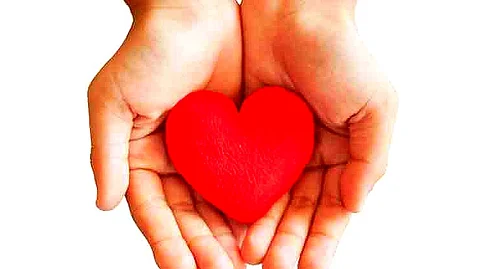

Picture this: a young, athletic actor collapsing mid-scene while filming a heart-pumping action sequence. Or a pop star dropping suddenly during a high-energy performance.
It sounds like a Hollywood plot twist, but in reality, it’s part of an alarming rise in Sudden Cardiac Death (SCD) cases among young, seemingly healthy individuals.
As we mark World Heart Day 2024 on Sunday (September 29), leading cardiologists are urging people to take heart health seriously—and the lessons they share are just as important for those on the big screen as they are for everyday people.
Dr. Jagdish Hiremath, Director of the Cath Lab at Ruby Hall Clinic, Pune, warns that SCD is becoming an all-too-common occurrence during physical activities like gym workouts, athletic events, or even dance rehearsals—situations where individuals are particularly vulnerable.
“Sudden cardiac death can strike at any moment, and it often happens outside of hospitals,” he said. That’s right—real-life drama can unfold faster than you might think. And unlike the scripted kind, you don’t get a second take.
Sudden Cardiac Death
While heart attacks have long been the arch-nemesis in the world of health crises, Dr. Hiremath reveals that not every sudden collapse is a heart attack.
In fact, Sudden Cardiac Death is caused by an abrupt electrical malfunction in the heart, leading to either a complete stop or dangerously erratic rhythms that disrupt blood flow to the body.
This means that without immediate action—specifically CPR or the use of an Automated External Defibrillator (AED)—the outcome is often fatal.
Here’s where the suspense heightens: the chances of surviving SCD drop with each passing minute. “If immediate cardiopulmonary resuscitation (CPR) is not administered within the first few minutes, the chances of survival decrease dramatically,” Dr. Hiremath explained.
Think of CPR and AEDs as the superhero duo in this scenario—the sooner they spring into action, the better the odds of saving the day. And get this: survival rates for sudden cardiac arrest in India hover at a tragic 0.1%. It’s not just about awareness—it’s about empowerment.
Take Action to Prevent SCD
So, how do you avoid this real-life horror story? Dr. Hiremath stresses that CPR and AED training should be part of everyone’s life script—especially for people over 15.
Whether you’re a gym enthusiast, a weekend warrior, or gearing up for your next marathon, being prepared is crucial. Advanced treatments like implantable defibrillators are available for those who have survived SCD, offering a safety net for the future, but the key is early intervention.
For those planning physically intense activities—whether it’s training for a big race or even performing in a grueling dance routine—Dr. Hiremath recommends thorough medical check-ups to ensure your heart is in the clear.
Heart Attack
In the world of heart health, Sudden Cardiac Death isn’t the only antagonist. Heart attacks, or Acute Myocardial Infarction (AMI), have long been the well-known villain in our collective consciousness.
Dr. Prasad Shah, Senior Consultant Interventional Cardiologist at Poona Hospital, Pune, weighs in on this storyline: a heart attack happens when blood flow to part of the heart is blocked, usually by a buildup of plaque in the coronary arteries.
Deprived of oxygen, the heart muscle starts to die—and without quick medical intervention, the damage can be life-threatening.
Dr. Shah breaks down the symptoms for us: chest pain, shortness of breath, and nausea are the major red flags. If you’re experiencing any of these during a workout or even while relaxing, don’t ignore them. Time is of the essence, and getting help fast is the key to surviving this heart-stopping moment.
Lifestyle Changes
But here’s the plot twist you can control: lifestyle changes can make a huge difference in preventing both SCD and heart attacks. Dr. Shah emphasizes the importance of adopting a heart-healthy lifestyle.
Think of it as building your own protective shield. A balanced diet rich in fruits, vegetables, whole grains, and healthy fats can keep your heart strong and resilient. And of course, limiting processed foods high in salt, sugar, and unhealthy fats is part of the script.
Regular physical activity is another major player in this health drama. Whether it’s going for a walk, cycling, or dancing to your favorite tunes, keeping active helps maintain a healthy weight, lower blood pressure, and improve cholesterol levels. In the grand scheme of things, it’s the perfect training montage for a healthier you.
Quit Smoking
When it comes to heart health, the worst villain of all is smoking. Dr. Shah warns that tobacco use is a major contributor to heart disease, and kicking the habit is one of the most significant steps you can take for your heart.
Add to that managing stress, which can lead to high blood pressure and heart problems over time, and you’ve got a solid plan to keep your heart in prime shape for the long haul.
For those with a family history of heart disease or pre-existing conditions like hypertension or diabetes, regular check-ups are a must. After all, the best way to avoid a surprise ending is to stay ahead of the game with preventive care.
Your Call to Action
This World Heart Day, it’s time to take a page out of Hollywood’s playbook: don’t wait for a dramatic moment to play the hero in your own health story.
Whether you’re in the limelight or behind the scenes, knowing CPR, making healthy lifestyle choices, and staying proactive about heart health can make all the difference.
